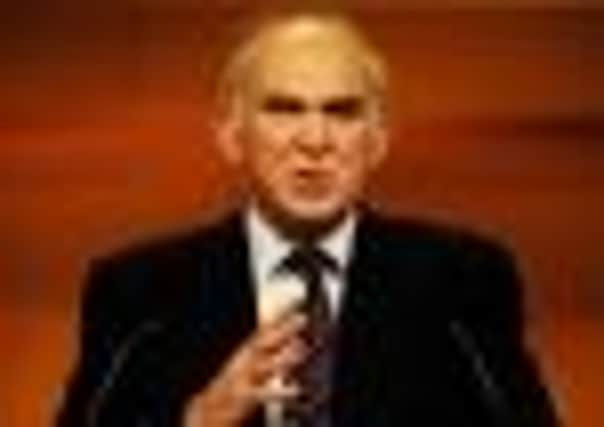Angela Merkel must let the European Central Bank off the leash to save euro, says Vince Cable


In an exclusive interview with Scotland on Sunday, the UK’s Business Secretary said that the only answer to the crisis is to give the European Central Bank (ECB) “lender of last resort” facilities, to demonstrate to markets that there was a safety net beneath the eurozone.
But in a stark warning to Europe’s biggest economy, he said: “The key political issue is Germany and Germany’s willingness to do what it has to do make the eurozone work. Obviously there are reciprocal things, and the Greeks and Italians have to sort out their finances, but the big political choice is around Germany and around whether they are willing to cede to the ECB the necessary freedoms to bring this crisis to an end. It is a big political decision for them but it is what they have to do.”
Advertisement
Hide AdAdvertisement
Hide AdThe plan – backed by one of the architects of the Maastricht Treaty, Portuguese president Cavaco Silva – is bitterly resisted in Germany amid fears it would lead to rocketing inflation.
The country is scarred by the hyperinflationary turmoil of the 1920s, widely blamed in Germany for nurturing the rise of the Nazis. It has therefore refused to countenance the ECB stepping in with potentially billions of pounds in loans to southern Europe to keep it afloat.
The leading coalition party in Germany, the Christian Democrats, is expected this week to advocate rules making it easier to throw member states out of the eurozone.
David Cameron has warned there are “serious question marks” about the future of the single currency and that the country faces “a difficult time because of what is happening in the eurozone”.
Cable added: “There needs to be a proper firewall around Italy and potentially Spain so they can get access to funding to stave off speculation. That is where the problem is at the moment as there are doubts about whether the ECB has got enough firepower.”
Yesterday, the Deputy Prime Minister, Nick Clegg, said: “If history teaches us one thing in Europe it is that when political elites lose touch with their people at a time of economic insecurity, the people who benefit are nasty extremists.”
Labour leader Ed Miliband yesterday accused the government of using Europe as a smokescreen for failing to promote jobs and growth in the UK. At a party conference in the West Midlands, he said: “It is time David Cameron and George Osborne started taking responsibility for what is happening in the British economy.”
Pressed on whether the UK Government should loosen the purse strings to help boost the economy, Cable insisted ministers had “very little freedom for manoeuvre”.
Advertisement
Hide AdAdvertisement
Hide AdWith the UK facing a “dangerous world”, he nonetheless said that if ministers provide a quick economic stimulus now it could cause a “crisis of confidence” in Britain’s determination to pay down its own debts.
He added: “It would be so easy and attractive for myself and George Osborne to say we are going to spend lots more money and cut everyone taxes. It would make us incredibly popular in the short run but it would be financially irresponsible and it would have disastrous consequences. We know this is unpopular. It’s not nice but it is something we have to do.”
Cable was speaking after Scotland’s leading economic think-tank, the Fraser of Allander Institute, said last week that there was a case for “fiscal easing” in order to help boost growth.
The institute said that the benefits of reducing Britain’s debt mountain were being outweighed by the costs of a flat-lining economy.
Cable said that the UK Government does have a growth plan, which will be further explained later this month, when Osborne makes his autumn statement to parliament. He added: “It makes me so angry when I hear ‘you people are all about cuts’. My department was already being cut when I got into it. Whatever government there had been would have been cutting public spending and bringing the deficit down.”